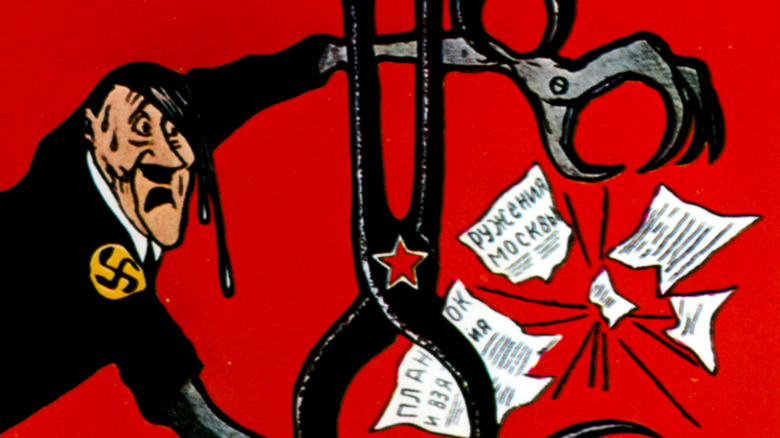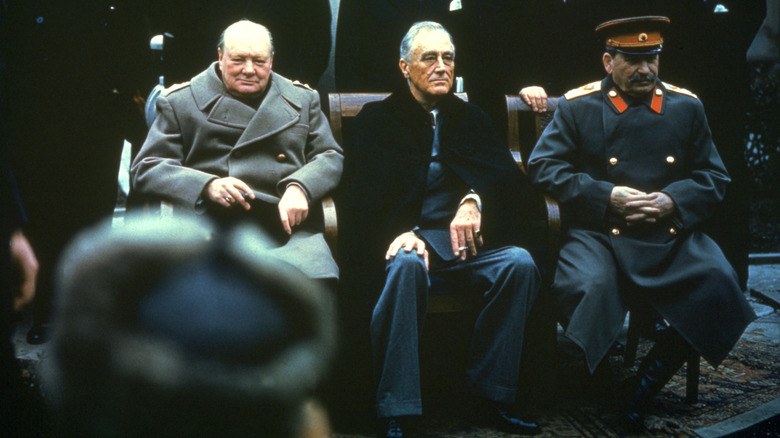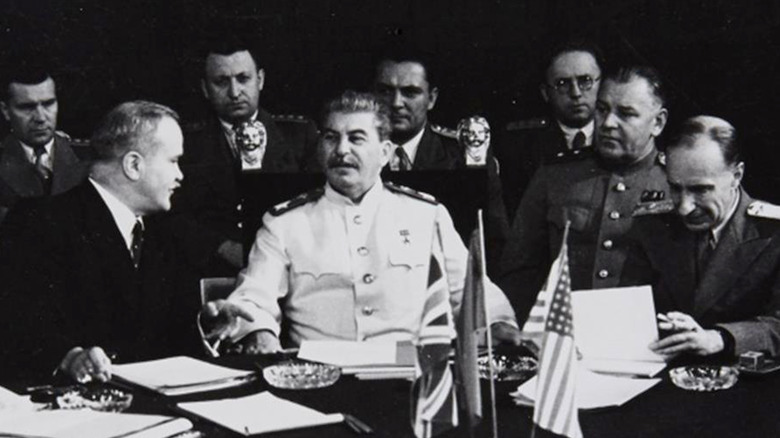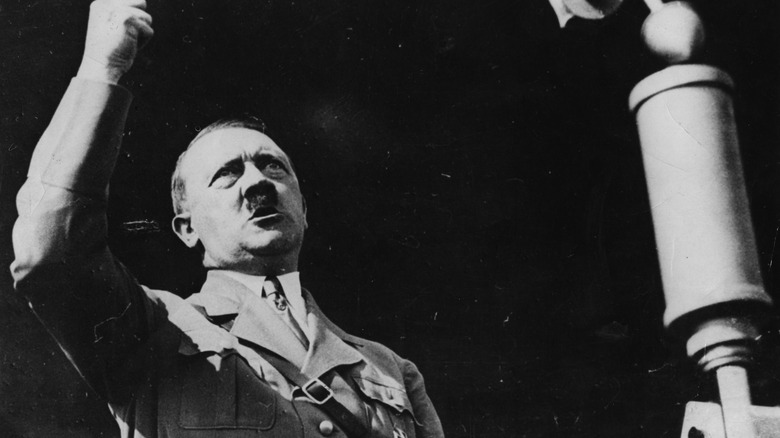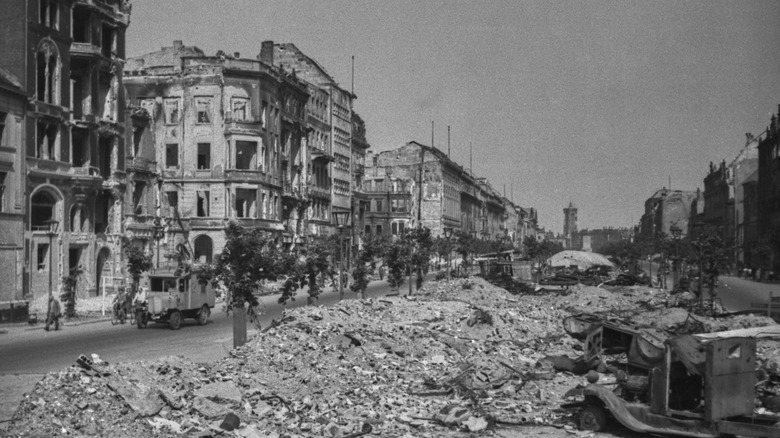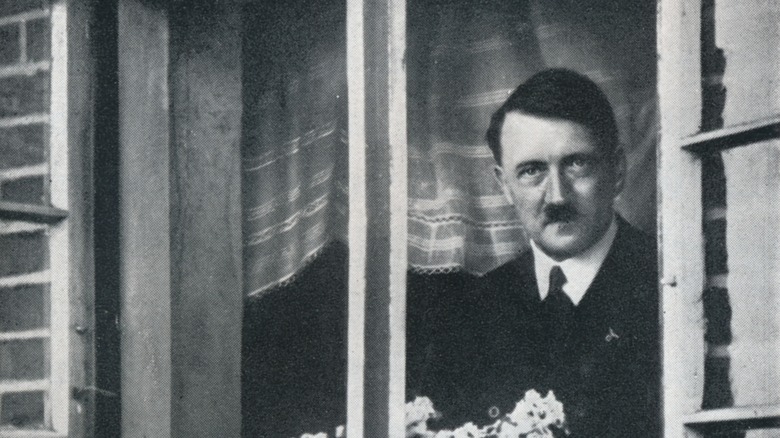What Would Have Happened If Hitler Was Caught At The End Of World War II?
In a way, Adolf Hitler was a long time dying. For months, he had been sequestered 50 feet below the Earth in his Führerbunker as the Allies rained fire down upon Berlin, though not without ventures outside. His armies were broken, his orders were being disregarded by his own generals, and the communists were coming for the capital and for him. By the end of April 1945, news had reached the Führer of the brutal killing of his ally, Benito Mussolini. With that example before him and with all his mad dreams of a racially pure Third Reich in ruins, Hitler decided to take his own life. He and his longtime companion Eva Braun died in a suicide pact and, by his will, were burned immediately after their deaths. When the Russians took custody of Berlin shortly after, they moved his remains several times before pulverizing and scattering them, denying any lingering admirers of Hitler a grave to memorialize.
It was an inglorious and pitiable end for the 20th century's most prominent face of state evil. It was also a death free from the mob violence and dark catharsis of Mussolini's execution, or the sense of justice that came with the Nuremberg trials. Nuremberg may well have been where Hitler would face trial and execution had he been taken alive. But a vengeful Soviet army may well have subjected him to a fate not unlike Mussolini's. And what plans there were for Hitler and the Nazi leadership did not necessarily reflect the private desires of certain Allied leaders.
Winston Churchill wanted summary execution for Hitler
Adolf Hitler's crimes were self-evident by 1945, and the British leader, for one, was not inclined to show him mercy. Winston Churchill, a few politically conciliatory statements to the contrary, made plain his antipathy for Hitler and Nazism years before World War II began. His hatred for Hitler by mid-war was such that the prime minister already had a vivid and ruthless plan in mind for how to dispose of him. "If Hitler falls into our hands we shall certainly put him to death," he declared in one cabinet meeting in 1942 (via The Guardian), and he recommended that the electric chair was the appropriate method for a man he declared a "gangster."
Churchill was still in favor of summary execution by 1945, dismissing any potential trial of Hitler or any other Nazi leader as a "farce." In this, he was opposed by his fellow Allied leaders. As one diplomatic exchange put it (via the U.S. State Department's Office of the Historian), "There must be no executions without trial otherwise the world would say we were afraid to try them." The Moscow Declaration of 1943 and the Yalta and Potsdam Conferences affirmed the Allied intent to demilitarize Germany and put any Nazi responsible for war crimes on trial.
The cream of Nazi leadership faced justice before the International Military Tribunal at Nuremberg, and contrary to Churchill's fantasies, it is likely Hitler would have been tried there had he been captured. Given the sentences handed down to many top brass at Nuremberg, it's almost certain Hitler would have been executed in the end — by hanging, not the chair.
Would Hitler's capture help the Soviets shape Nuremberg?
In some eyes, the justice of the Nuremberg trials was tainted by the involvement of the Soviet Union. There were several ironies to Soviet involvement in prosecuting the Nazis for war crimes; their one-time alliance with Nazi Germany, the involvement at Nuremberg of prosecutors who were party to Russian show trials, and the Soviet attempt to pin the Katyn Massacre on Germany.
In fact, it was Joseph Stalin who was instrumental in establishing a postwar legal framework at all. Putting Nazi leadership on trial was, in his mind, a valuable piece of political theater that would bolster the Soviet Union's internal unity and international prestige. But Stalin envisaged something more akin to his show trials, something that he could puppet from afar. Against Western notions of due process, the Soviet delegation struggled to keep up with their counterparts in the prosecution.
Might securing the top Nazi have let Stalin shape the trials more to his liking? The Russian position on the Eastern front by 1945 gave him significant leverage at the Yalta Conference. Had Soviet troops taken Adolf Hitler alive, Stalin would have had another valuable bargaining chip. He might have won some concessions on the character of the tribunal as the price for extraditing Hitler for a joint Allied prosecution. Denied that, he may have had Hitler tried in Russia and used Hitler's own words as evidence, making the trial part of the ideological battle between capitalism and communism.
What defense could Hitler have used?
One refrain of the defense sounded constantly throughout the Nuremberg trials, to such a degree that it has become known as the Nuremberg defense: "just following orders." Expressed in so many words, it was the tried Nazi leadership's attempt to pass the buck onto the one man who could not stand before the International Military Tribunal. It was Adolf Hitler, the defendants claimed, who set policy, the full and horrific consequences of which his followers were unaware.
Given the intense professions of loyalty to Hitler by some of the Nuremberg defendants, one wonders if they would have tried to pin the blame on him had he been alive. But Hitler would not have been able to lay the blame on a higher authority had he been brought to trial; his was the highest position in the state. He could hardly plead ignorance either; besides his status as the leader of Germany, there was ample evidence of Nazi atrocities. Many who were tried at Nuremberg didn't even attempt to claim they hadn't done horrible things, only that they weren't responsible for them.
Denied the "superior orders" defense, Hitler might have used a number of other arguments put forward during Nuremberg. He might have claimed the charges amounted to post ex facto law, or that war crime charges could only be leveled at states, not individuals. Given that the IMT rejected these defenses without Hitler, it's a safe bet they wouldn't have saved him from the noose.
Mob violence might have killed Hitler before a trial
Had Russian soldiers been able to take Adolf Hitler alive, there is the possibility that he never would have lived to see Nuremberg. Having long been subjected to some of the most brutal conditions of the entire war at the hands of the Nazis, the behavior of the Red Army in Berlin at the end of World War II is infamous for its violence. In the words of one soldier (via the Warfare History Network), the Russians sought "revenge for everything, and our revenge is just. Fire for fire, blood for blood, death for death." Forced collectivization begun well before the war had also deprived many in Russia of goods and opportunities, and propaganda contributed to a culture of sexual repression. Resentments and impulses, fueled by alcohol, exploded during the "liberation" of Berlin in a swirl of looting, rape, and murder.
The reputation of the Red Army was severe enough that the likes of Hermann Göring sought to surrender to the Western Allies rather than face the Soviets. While some Nazis, such as Hans Fritzsche, were taken prisoner by Russian forces and later extradited to Nuremberg, the sight of the supreme leader of the Nazis may have been too much for the rank and file who would have handled Hitler's initial captivity. A mad soldier or an embittered officer might have had Hitler killed there in Berlin, not unlike Benito Mussolini's death at the hands of partisans at the Italian border.
How long could Hitler had lived in captivity?
Could Adolf Hitler have lived to see conviction and execution at Nuremberg, even if he were captured? His health had collapsed by 1945, and theories have run rampant ever since about the state of his mind and body in his final months. It's long been thought that Hitler had Parkinson's disease. It's probable that he did, though the tremors seen in his hand in newsreels could also be explained as withdrawal symptoms; the opiates he was regularly injected with fell into short supply by the war's end.
It's also been widely speculated that Hitler had syphilis, and was possibly in the tertiary phase by 1945. But a military doctor who examined Hitler in his last days, Ernst Gunther Schenck, maintained that tests for syphilis came back negative (via the Chicago Tribune). Schenck also felt that Hitler's many ailments and complaints about himself were largely psychosomatic. But Schenck was shocked by Hitler's hunched, shriveled appearance when he examined him. "I was looking at the eyes of death," he later told American Medical News (via UPI). "We all were doomed. I was looking into the eye of death."
In such a physically weakened state, Hitler would have been ill-prepared to weather the harsh conditions of captivity at Soviet hands. Russian secret police subjected other Nazis to relatively limited physical torture but intense psychological conditioning. And according to Schenck, one genuine ailment Hitler suffered from was arteriosclerotic heart disease. Illness, imprisonment, and the loss of the war in combination might have done him in before he could be put on trial.
